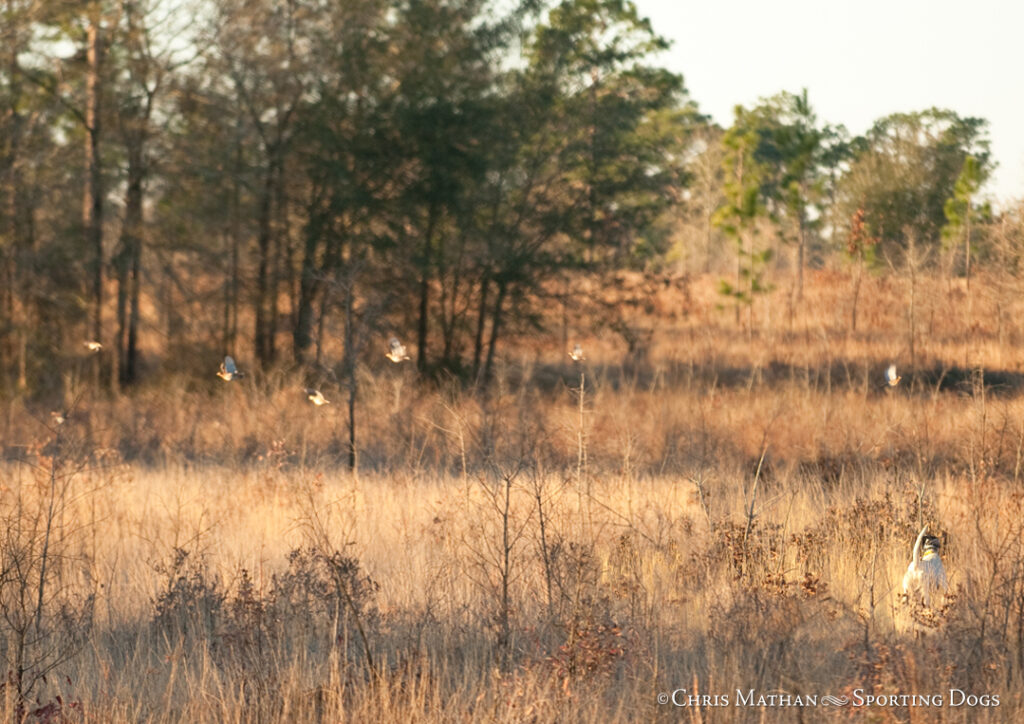Once upon a time, about 1990, a young man from Albany, Georgia, had a great job. He was dog trainer and hunt manager on one of the south’s largest Yankee Quail Plantations. His father was manager of the plantation, his brother the manager of its pecan orchards and other agricultural operations. He had won two years in a row the Yankee Trial, the Owner’s Trial of the Georgia-Florida Field Trial Club, composed of the multimillionaire owners of the quail plantations between Albany and Tallahassee. The Club has since 1916 sponsored each President’s Day (except in war years) a one-day trial for wagon dogs from the plantations.
When the owner of the plantation died, it was divided into three and sold, and the young man became dog trainer and hunt manager of one. After a few years, he resigned to become self-employed as a for-the-public trainer-handler of all-age field trial pointing dogs. There was then, and is today, no more insecure profession.
Why did the young man give up a secure and well-paid job for the most insecure on the planet? I asked him that when interviewing him after he won the 1997 Florida Open All-Age Championship at Chinquapin Farm, O’Brien, Florida, one of the sport’s top trials.
“There is something about living in another man’s house, driving another man’s truck, riding his horse, and saddling his for him to ride, and saying ‘yes, Sir’ to him a dozen times a day that gets old for some of us. And then there is the competition.”
So said Rick Furney, who went on to reach the top rung in his profession and stay there many years. He handled three pointers to the Field Trial Hall of Fame, Nat. Ch. Law’s High Noon (2008), Miller’s Southern Pride (2012) and Nat. Ch. Miller’s On Line (2014). He also won Purina Handler and Dog of the Year awards.
The dog Rick won the Florida with in 1997, House’s Shady Lady, was one of three sisters that in their prime years kept three handlers in the top ranks, the other two being Lehar’s Main Tech and Lehar’s Perfect Tech (Andy Daugherty and Billy Wayne Morten, handlers). All three were known to lay down spectacular ground races whenever and wherever released. But Shady Lady had a hole, requiring all Rick’s skill (and luck) to manage.
Judging the Florida in 1997 were two of the National Championship’s judges, Joe Walker and Nathan Cottrell. They were instructing me in what to look for in an all-age performance (I had reported my first trial in 1995 and was very green). Nathan had near the end of Shady Lady’s hour commented how he liked how Rick was handling her, riding just before the judges and letting her pattern at the front.
Just then, she pointed, and Rick lifted his cap, yelled point, and spurred his mount. As he approached Shady Lady, her birds lifted before her, but she did not move and was in full view of judges and gallery.
This was her third find and it cinched the Championship for her.
Later I learned that the lifting of the covey prematurely had been a great stroke of good luck for Rick and Shady Lady.
Shady Lady’s “hole” was that after two finds she would often, when Rick flushed in front of her, lose composure and sink to the ground. When her birds lifted on their own at Chinquapin, she stayed high and tight.
At the Invitational at Paducah the following Thanksgiving weekend, Shady Lady’s hole betrayed her the second day, and Rick had to lift her. But Rick, who had on his bucket list winning the Invitational, accomplished it in 2005 with Miller’s Southern Pride. That was the last year it ran on wild birds. With four hours of spectacular groundwork, Pride was named Champion with one find.
Rick has an unusual attitude toward field trial judges. He says, “I never get mad about judges’ decisions. It’s a matter of averages. I got wins I didn’t think I deserved, and losses I thought I should have won.” He says it with a smile.
Rick now captains the Panama City-docked fishing boat of his friend and fellow Lee County, Georgia native, the country music super-star Luke Bryan.
